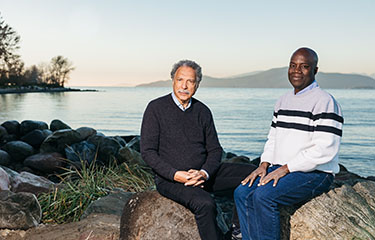"Nobel Prize for the Environment" recipients call for ban on all fishing on the high seas

The Tyler Prize for Environmental Achievement, sometimes referred to as "Nobel Prize for the Environment" and administered by the University of Southern California, announced on 22 February, 2023 the co-recipients of its latest award are two Canadian fisheries experts: ecologist Daniel Pauly and economist Rashid Sumaila.
The two winners will split the USD 250,000 (EUR 234,000) prize, which will be presented on 27 April at the University of Southern California.
The Tyler Prize is awarded to Pauly and Sumaila for their efforts to protect the ocean environment, which a release from the price called the "lungs of the planet." Both scientists have said they want to use the prize to spread awareness of an urgent and "evidence-based" message – “all fishing on the high seas should be banned."
“Creating no-take marine reserves is something we must do. Banning fishing in the high seas, which is the area outside the 200-nautical-mile zones of maritime countries, will create a critically needed ‘fish bank’ for the world,” Sumaila said.
Sumaila is a professor at the University of Killam and research chair in interdisciplinary ocean and fisheries economics at the School of Public Policy and Global Affairs at the University of British Columbia. With roots in Nigeria and Ghana, he received a bachelor's degree in quantity surveying from the Ahmadu Bello University and doctorate from the University of Bergen.
Sumaila’s research focuses on bio-economics, marine ecosystem evaluation, and global issues analysis, such as fisheries subsidies, marine plastic pollution, and oil spills. His ocean expertise comes from working in fisheries and projects in Norway, Canada, the North Atlantic region, Namibia, South Africa, Ghana, West Africa, Brazil, South America, and China.
In 2021, Sumaila published the book Infinity Fish: Economics and the Future of Fish and Fisheries.
“I consider Dr. Rashid Sumaila to be the most eminent, prolific, and profoundly progressive fisheries bio-economist alive today,” Research Professor at Carleton University Steven J. Cooke said.
Sumaila has written numerous papers analyzing global fisheries, including a paper warning of fisheries collapse in the East and South China Sea. He has been a vocal critic of the World Trade Organization's deal on fishing subsidies, and has called for a ban on subsidies that can lead to overcapacity or overfishing. Sumaila also, through the Sea Around Us project, created estimates of the economic loss that illegal, unreported, and unregulated fishing results in.
Pauly was born in France, raised in Switzerland, and studied in Germany, where he earned his doctorate from the University of Kiel in fisheries biology, zoology, and physical oceanography. He has become one of the most-cited fisheries scientists in the world after spending nearly four decades researching and documenting rapid declines in marine and freshwater fish. He is known for popularizing the term "shifting baselines" to explain environmental decline over time. He became a professor at the UBC Fisheries Center, now the Institute for the Oceans and Fisheries. Pauly held the position of its director from 2003 to 2008, founded the Sea Around Us, and co-founded Fishbase.org.
The two scientists are calling for a global ban on all fishing on the high seas – or everything outside of a 200-nautical-mile of a nation's coastline. According to research by Pauly and Sumaila, the ban could be implemented with little impact on global catch.
“Our modeling shows that closing the high seas would result in no loss in total global catch – just a more-equitable distribution," Pauly said. "Most commercially fished species move back and forth between the high seas and coastal areas, where they can be caught in a country’s exclusive economic zone (EEZ)."
Both Pauly and Sumaila have published work on the ecological and economic effects of industrial fishing bans on the high seas that has received support from the broader scientific community. They have also co-authored research calling for an end to government subsidization of major fishing companies.
“If we don’t stop overfishing, we will lose marine stocks essential for food security and biodiversity, and the ocean’s ability to effectively regulate global temperatures,” Pauly said. “A high seas fishing ban is one of the most effective ways to reverse the damage inflicted on the ocean through decades of unsustainable overfishing, mostly at the hands of wealthy Western countries.”
Sumaila said a ban would be beneficial for the environment and for equitable distribution of ocean reasources, while preventing overfishing.
“Banning fishing on the high seas – it’s good for biodiversity, it’s good economically, it’s good for global food security. And it’s good for equity of distribution, because smaller countries benefit when fish come into their catchment area, instead of only China, Korea, Japan, Spain, etcetera, taking all the fish in the high seas," he said. "There are so many good reasons to do this ... before it is too late.”






Share